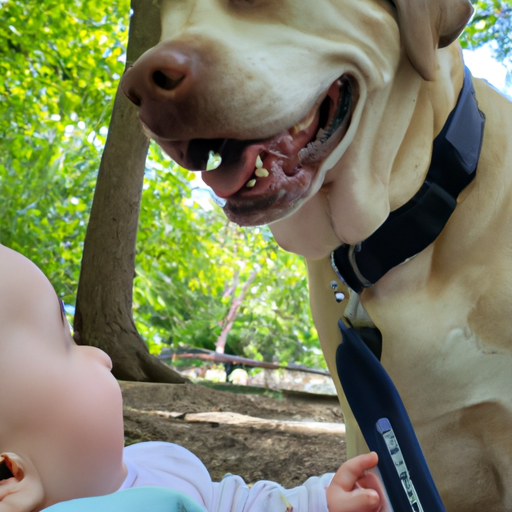Understanding the Canine Instinct
As a devoted caregiver, you’ll notice that your furry friend often displays a surprising level of gentleness and patience when interacting with your baby. This gentle behavior is largely a result of your dog’s instinctual nature. Dogs, descendants of wolves, are pack animals. They naturally understand the concept of family and often view your baby as a defenseless pack member who needs protection.
The Role of Socialization
Socialization plays a crucial role in a dog’s behavior around babies. If a dog is properly socialized, it will be more comfortable around different people and environments, including babies. As you introduce your dog to new sights, sounds, and smells, including those associated with a baby, your dog learns to adapt and react appropriately.
- Early Introduction: Introduce your dog to baby-related items before the baby’s arrival to help it acclimate.
- Modulated Exposure: Gradually increase the time your dog spends around the baby.
- Positive Association: Associate the baby’s presence with positive things for the dog, like treats or praise.
Dogs’ Perception of Babies
Dogs perceive babies differently than adults. They can sense that babies are vulnerable and need care. This perception often triggers a gentle, protective behavior in dogs.
| Dog Perception | Resulting Behavior |
|---|---|
| Vulnerability | Protectiveness |
| Small size | Gentleness |
| Unique sounds | Curiosity |
The Impact of Breed and Temperament
While most dogs are gentle with babies, breed and temperament can affect their behavior. Some breeds are naturally more patient and gentle, making them better suited for households with babies. However, every dog has a unique personality. As such, individual temperament can outweigh breed tendencies.
- Patient Breeds: Labrador Retriever, Beagle, Bulldog
- Less Tolerant Breeds: Siberian Husky, Dalmatian, Chihuahua
Nurturing the Dog-Baby Bond
Creating a strong bond between your dog and baby is crucial. This relationship will not just happen overnight; it requires time, patience, and understanding. Here are some tips:
- Supervise Interaction: Always be present when your dog and baby are interacting.
- Encourage Gentle Play: Teach your dog appropriate ways to play with the baby.
- Reward Good Behavior: Positive reinforcement can go a long way in strengthening the bond.
FAQs
Q: What should I do if my dog is not gentle with my baby?
A: Consult a professional dog trainer or a behaviorist. They can provide guidance tailored to your dog’s specific needs.
Q: Is it safe to leave my baby alone with the dog?
A: No. Always supervise any interaction between your dog and baby to ensure safety.
Q: How can I prepare my dog for the baby’s arrival?
A: Start introducing your dog to baby-related items, sounds, and smells before the baby arrives.
Q: Can dogs be jealous of the baby?
A: Yes, dogs can experience jealousy. Make sure to give your dog attention and love even after the baby’s arrival.
Q: Should I be concerned if my dog is overly protective of the baby?
A: While protectiveness is natural, excessive protectiveness can lead to aggression. If your dog displays this behavior, seek professional advice.



